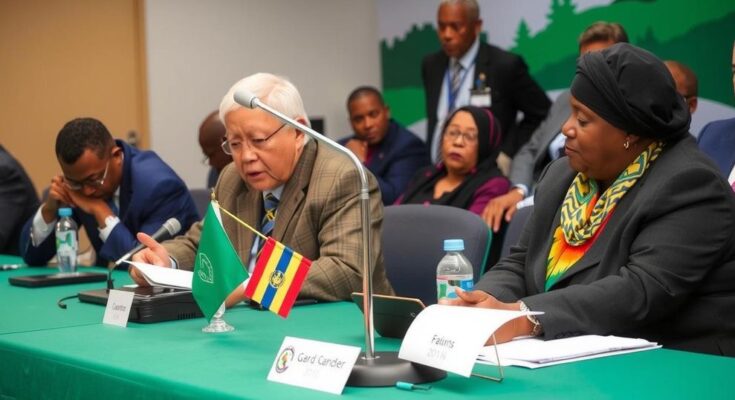During his visit to Lesotho, U.N. Secretary-General António Guterres urged wealthy nations to uphold their climate finance commitments of $300 billion annually for developing countries, highlighting Africa’s disproportionate vulnerability to climate change. He also advocated for Africa’s representation in the U.N. Security Council and emphasized the need for operationalizing the Loss and Damage Fund to support nations affected by climate disasters.
In Lesotho, on Thursday, United Nations Secretary-General António Guterres appealed to affluent nations to fulfill their financial commitments for combating climate change, particularly for impoverished countries. Addressing the Parliament of Lesotho, Guterres emphasized the urgent necessity for developed nations to provide $300 billion annually to aid developing countries grappling with the effects of climate change. He underscored the disproportionate impact of climate change on Africa, despite its minimal contribution to global warming. Guterres’ remarks coincide with his tour of southern Africa, during which he advocated for stronger representation for African nations within the U.N. Security Council.
The Secretary-General’s visit to Lesotho, after attending a meeting in South Africa, includes a planned inspection of the Katse Dam, a crucial part of the nation’s water management strategy. He reiterated the need for operationalizing the new Loss and Damage Fund to support nations affected by climate-related disasters, pressing wealthier countries to honor their pledges amid a severe drought affecting over 27 million people in the region. Countries at recent U.N. climate talks agreed to allocate at least $300 billion each year to assist developing nations, yet this figure falls significantly short of the $1 trillion requested by these nations.
Guterres articulated the plight of landlocked, least developed countries like Lesotho that are especially vulnerable to climate change. He stated, “Developed countries must meet their commitments … and deliver the promised $300 billion annually for climate finance.” Additionally, he recognized the broader implications of Africa’s absence from the Security Council, calling it a “relic of colonialism” that denies a continent with over 1.4 billion people their rightful place in global governance. Furthermore, he expressed hope for Africa to secure at least two permanent seats on the Council by the conclusion of his term in December 2026.
The drought conditions affecting Southern Africa, linked to the El Niño phenomenon, have exacerbated a hunger crisis across several nations, with Lesotho among those declaring national disasters due to crop failures. Guterres’ ongoing initiatives highlight the pressing need for urgent financial support and robust international cooperation to address the repercussions of climate change in vulnerable regions.
The issue of climate finance is critical for developing nations, particularly those in Africa, which face severe challenges from climate change despite their minimal contributions to global emissions. The U.N. climate talks have documented the necessity for financial support to help these nations mitigate climate impacts. Secretary-General Guterres’ call for affluent countries to honor their pledges reflects ongoing concerns regarding equity and support for vulnerable populations in the face of environmental disaster. Furthermore, Africa’s lack of permanent representation in the U.N. Security Council points to broader issues of historical injustice and the need for reforms that reflect current global demographics and power dynamics.
In summary, Secretary-General António Guterres has called on wealthy nations during his visit to Lesotho to fulfill their financial obligations to assist developing countries in combating climate change, particularly emphasizing the urgency of addressing the ongoing drought and its devastating effects. His advocacy for Africa’s representation in global governance underscores the importance of reforming international structures to include a continent deeply affected by climate challenges. The collective efforts toward operationalizing climate funds could reshape the future for many vulnerable nations.
Original Source: abcnews.go.com




